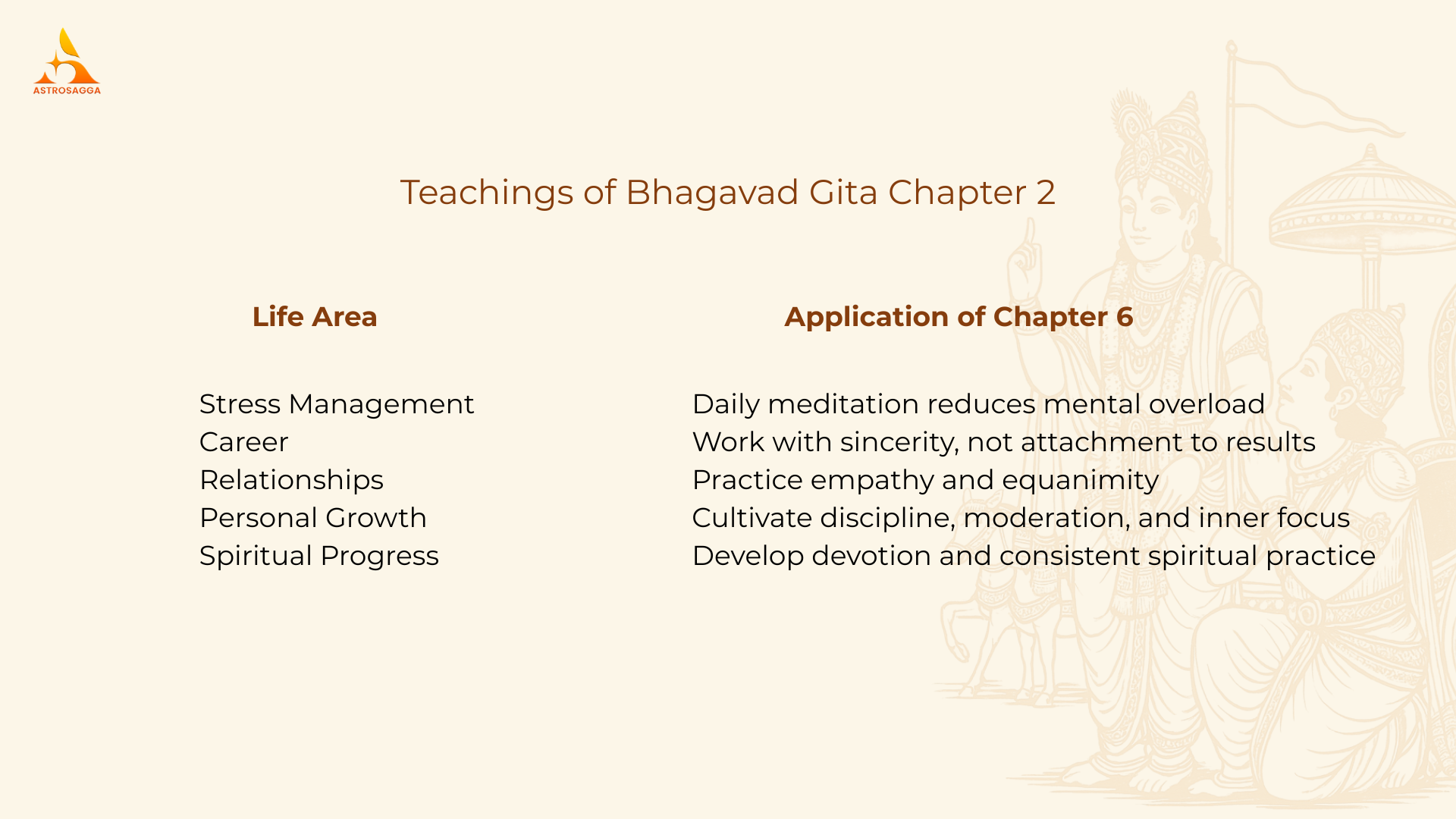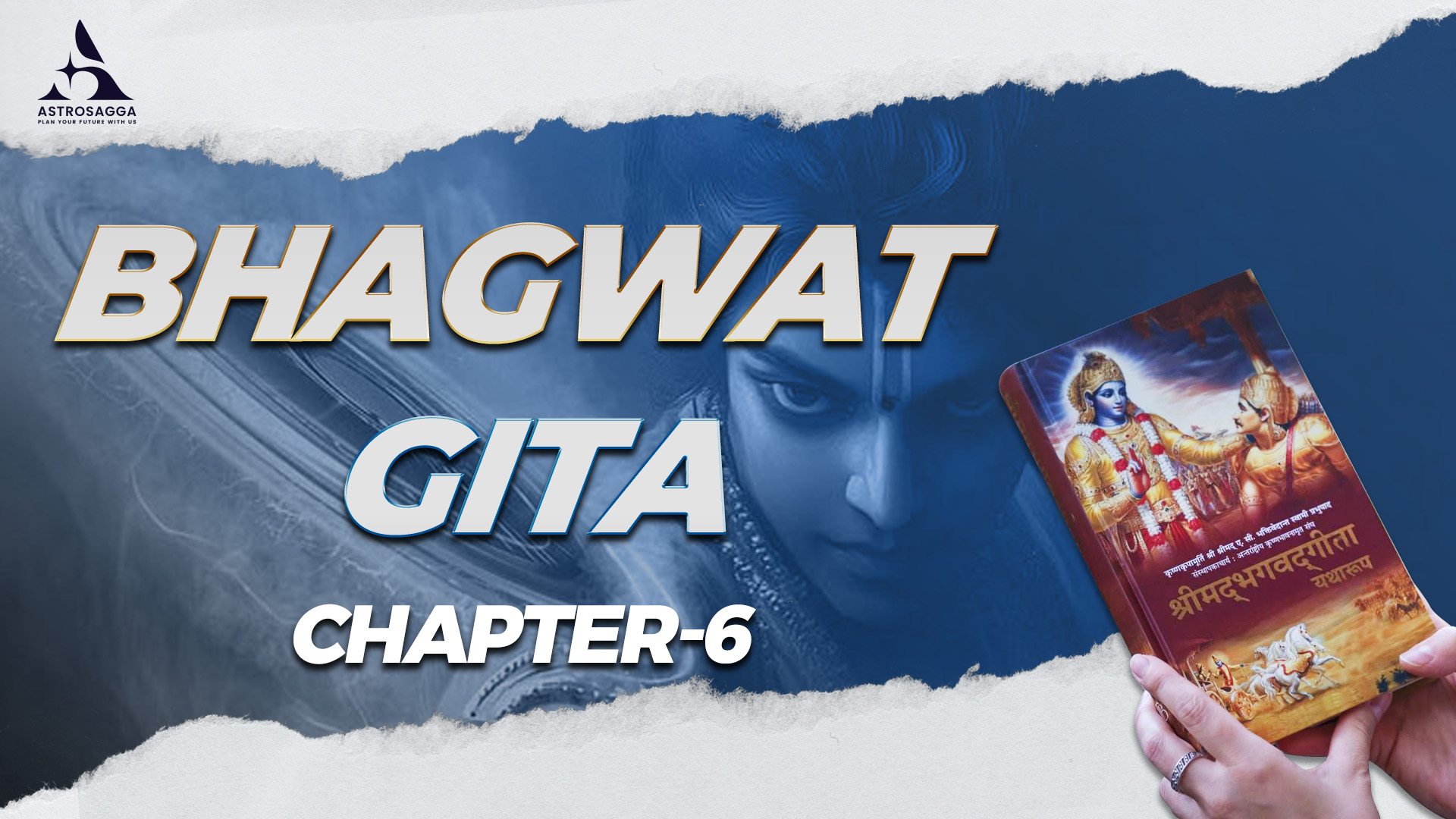Bhagavad Gita Chapter 6, known as Dhyana Yoga or the Yoga of Meditation, offers deep wisdom about self-discipline, inner peace, and the yogic path. In this chapter, Lord Krishna elaborates on the importance of controlling the mind, detachment from materialism, and how one can attain ultimate spiritual realization through meditation and devotion. This chapter is a guiding light for modern seekers who wish to balance daily life with inner stillness.
Summary of Bhagavad Gita Chapter 6
In Bhagavad Gita Chapter 6, Lord Krishna describes the lifestyle and mindset of a true yogi. The chapter teaches how to meditate, develop inner balance, and grow spiritually. It emphasizes that one does not have to renounce the world but must rise above attachment and ego to walk the path of yoga.
Key themes include:
Renunciation vs. Karma Yoga
The practice of meditation
Self-control and detachment
The qualities of a true yogi
The destiny of one who fails in yoga
The greatness of the devotee (bhakta)
Read Also - Bhagavad Gita Chapter 5 – Practical Tips for Life
Important Verses from Bhagavad Gita Chapter 6 (with Sanskrit Slokas)
1. Importance of Karma and Detachment
Slokh (6.1):
अनाश्रितः कर्मफलं कार्यं कर्म करोति यः।
स संन्यासी च योगी च न निरग्निर्न चाक्रियः॥
Translation: He who performs his duty without expecting the fruits is a true renunciate and a yogi, not one who has merely renounced external actions.
Tip: Focus on actions, not the results. It reduces anxiety and builds resilience.
2. Discipline is the Foundation of Meditation
Slokh (6.10):
योगी युञ्जीत सततमात्मानं रहसि स्थितः।
एकाकी यतचित्तात्मा निराशीरपरिग्रहः॥
Translation: Let the yogi try constantly to keep the mind steady, remaining in solitude with controlled mind and devoid of desires and possessions.
Tip: Create a dedicated space and time for daily silence and introspection.
Practical Life Lessons from Bhagavad Gita Chapter 6
1. Balance Between Work and Meditation
Unlike the misconception that spirituality requires abandoning responsibilities, Bhagavad Gita Chapter 6 explains that a true yogi is one who balances action with inner stillness. Perform your duties sincerely but remain inwardly detached.
Practice Tip: Dedicate at least 15 minutes daily to silent reflection or meditation even during a busy schedule.
2. Control Over Mind and Desires
The mind is both a friend and an enemy. If controlled, it leads to liberation; if uncontrolled, it causes suffering.
"For him who has conquered the mind, the mind is the best of friends; but for one who has failed to do so, his mind will remain the greatest enemy." (6.6)
Practice Tip: Reduce distractions, engage in conscious breathing, and avoid impulsive behavior.
3. Importance of Moderation
Bhagavad Gita Chapter 6 emphasizes the middle path—avoiding extremes in eating, sleeping, and recreation.
"He who is temperate in eating, sleeping, working and recreation can mitigate all sorrows through the practice of yoga." (6.17)
Practice Tip: Create a daily routine with balanced habits to sustain mental and physical health.
4. Meditation and Focus
Meditation (Dhyana) is the central practice in Chapter 6. Krishna teaches Arjuna how to meditate with focus on a single object, preferably the Divine, with the spine straight, body still, and mind calm.
Practice Tip: Begin with 5–10 minutes of seated breathing meditation and gradually increase.
5. Compassion and Equanimity
A yogi sees all beings as equal, transcending dualities like pleasure-pain, friend-enemy, joy-sorrow.
"He is the greatest yogi who regards every being as the same, whether in pleasure or pain, because he is empathetic to all." (6.32)
Practice Tip: Practice empathy in daily interactions—understand others' perspectives before reacting.
The Journey of the Unsuccessful Yogi
Even if one fails in this life to attain perfection in yoga, Bhagavad Gita Chapter 6 assures that no effort is ever wasted. Such a soul is reborn in a spiritually inclined family and continues the journey.
Lesson: Every sincere step toward inner growth accumulates. Stay committed without worrying about immediate success.
Who is the Best Yogi?
In the concluding verses, Lord Krishna declares that among all yogis, the one with devotion (bhakti) is the highest.
"Of all yogis, he who worships Me with devotion and abides in Me with his inner self merged in Me is considered the most devoted." (6.47)
Practice Tip: Merge your meditation and action with devotion—see your work as a service to the Divine.
Applying Bhagavad Gita Chapter 6 in Modern Life

Conclusion:
Bhagavad Gita Chapter 6 is a manual for those who seek inner peace in a noisy world. Its guidance on meditation, discipline, and devotion is timeless and universally applicable. Whether you're a student, a householder, or a seeker, this chapter gives you the tools to lead a balanced, meaningful, and spiritually enriched life.
Want personal guidance based on your life journey? Talk to astrologer now for clarity and the right direction.














